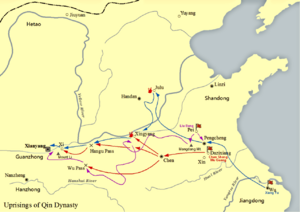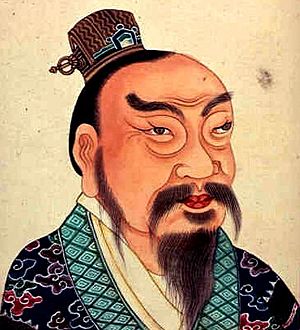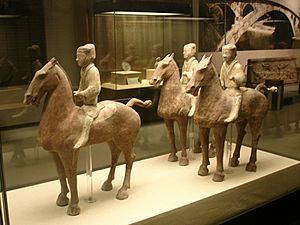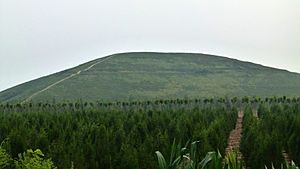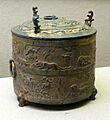Emperor Gaozu of Han facts for kids
Quick facts for kids Emperor Gaozu of Han漢高祖 |
|||||||||||||
|---|---|---|---|---|---|---|---|---|---|---|---|---|---|
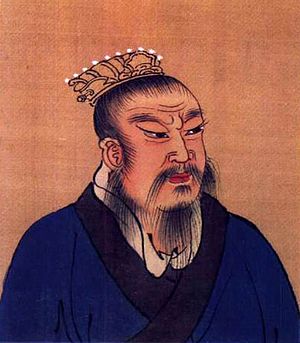 |
|||||||||||||
| Emperor of the Han dynasty | |||||||||||||
| Reign | 28 February 202 – 1 June 195 BC | ||||||||||||
| Predecessor | Dynasty founder | ||||||||||||
| Successor | Emperor Hui | ||||||||||||
| King of Han (漢王) | |||||||||||||
| Reign | March 206 – 28 February 202 BC | ||||||||||||
| Born | 256 BC Feng, Pei, State of Chu |
||||||||||||
| Died | 1 June 195 BC (aged 61) Chang'an, Han |
||||||||||||
| Consorts | Empress Lü Empress Gao Consort Cao Consort Qi Lady Zhao |
||||||||||||
| Issue | Liu Fei, King Daohui of Qi Emperor Hui of Han Liu Ruyi, King Yin of Zhao Emperor Wen of Han Liu Hui, King of Liang Liu You, King of Huaiyang Liu Chang, King Li of Huainan Liu Jian, King of Yan Princess Yuan of Lu |
||||||||||||
|
|||||||||||||
| Father | Liu Tuan | ||||||||||||
| Mother | Wang Hanshi | ||||||||||||
| Emperor Gaozu of Han | |||||||||||||||||||||||||||||
|---|---|---|---|---|---|---|---|---|---|---|---|---|---|---|---|---|---|---|---|---|---|---|---|---|---|---|---|---|---|
| Traditional Chinese | 漢高祖 | ||||||||||||||||||||||||||||
| Simplified Chinese | 汉高祖 | ||||||||||||||||||||||||||||
| Literal meaning | "High Ancestor of Han" | ||||||||||||||||||||||||||||
|
|||||||||||||||||||||||||||||
| Liu Bang (personal name) |
|||||||||||||||||||||||||||||
| Traditional Chinese | 劉邦 | ||||||||||||||||||||||||||||
| Simplified Chinese | 刘邦 | ||||||||||||||||||||||||||||
|
|||||||||||||||||||||||||||||
Emperor Gaozu of Han (born Liu Bang, 256 – 1 June 195 BC) was a very important leader in ancient China. He was the founder and first emperor of the Han dynasty, which was one of China's most famous dynasties. He ruled from 202 BC to 195 BC.
Liu Bang was special because he was one of the few Chinese emperors who came from a simple peasant family. Before he became emperor, he worked as a minor law enforcement officer in his hometown. When the Qin dynasty started to fall apart, Liu Bang became a rebel leader. He led his army to take over the Qin capital in 206 BC.
After the Qin dynasty ended, China was divided into many smaller kingdoms. Liu Bang was given a remote area called Bashu. But he soon broke out with his army. He started a big civil war known as the Chu–Han Contention against another powerful rebel leader, Xiang Yu.
In 202 BC, Liu Bang won the war. He united most of China under his rule. He then started the Han dynasty and became its first emperor. During his time as emperor, he made many changes. He lowered taxes, promoted Confucianism, and stopped rebellions. He also made peace with the Xiongnu people to the north. He died in 195 BC and his son, Liu Ying, became the next emperor.
Contents
- Emperor Gaozu of Han: China's First Peasant Emperor
- Images for kids
- See also
Emperor Gaozu of Han: China's First Peasant Emperor
Early Life and Beginnings
Liu Bang was born during the end of the Warring States period. This was a time when different states in China were fighting each other. His parents were known as "Old Sir Liu" and "Old Madam Liu." They lived in a place called Zhongyang, in the state of Chu.
Legend says that Liu Bang's mother met a dragon during a rainstorm before he was born. This story made him seem special and chosen to rule.
As a young man, Liu Bang was outgoing and generous. He was also quite charming. However, he didn't like studying or working much. He often got into trouble. His father even called him a "little rascal." He relied on his brother for food and support.
Later, Liu Bang became friends with Zhang Er. Zhang Er was a local official. Liu Bang lived with him for a few months. After that, Liu Bang returned to his hometown, Pei County.
His friends, Xiao He and Cao Shen, helped him get a job. He became a local sheriff in Sishui Pavilion. Liu Bang made many friends among the local officials. He started to gain a small reputation. Once, he saw the First Emperor of Qin on a tour. The grand procession greatly impressed him.
Liu Bang married Lü Zhi. Her father, Lü Wen, was a rich and important man. Lü Wen was so impressed by Liu Bang that he offered his daughter's hand in marriage. Liu Bang and Lü Zhi had two children: Liu Ying (who would become Emperor Hui) and Princess Yuan of Lu.
Rising Up Against the Qin Dynasty
Liu Bang was once in charge of taking prisoners to build the First Emperor's tomb. Some prisoners escaped during the journey. Under Qin law, this was a crime punishable by death. Instead of facing punishment, Liu Bang freed the remaining prisoners.
He then fled and became an outlaw. Some of the grateful ex-prisoners joined him. They made him their leader. They set up a base in an abandoned stronghold on Mount Mangdang. Liu Bang secretly stayed in touch with his old friends, Xiao He and Cao Shen.
Legend also tells of the "Uprising of the Slaying of the White Serpent." It said that Liu Bang's future as a ruler was foretold. A giant white snake killed some of his followers. Liu Bang killed the snake during the night. The next morning, they met an old woman crying. She said her child, the son of the White Emperor, was killed by the son of the Red Emperor. This made Liu Bang's followers believe he was destined for greatness.
Becoming the Duke of Pei
In 209 BC, a big rebellion started against the Qin dynasty. The local official in Pei County thought about joining the rebellion. His friends, Xiao He and Cao Shen, told him to invite Liu Bang to help. Liu Bang's brother-in-law, Fan Kuai, delivered the invitation.
However, the official changed his mind. He tried to have Xiao He and Cao Shen killed. But they escaped and joined Liu Bang. On Xiao He's advice, Liu Bang asked common people from nearby areas for help. They responded by killing the Pei County official. They then welcomed Liu Bang back. Liu Bang became known as the "Duke of Pei."
In 208 BC, many rebellions tried to bring back the old states that Qin had conquered. Liu Bang joined the uprising led by Xiang Liang. Xiang Liang was a commoner whose father was a general from Chu. He made Xiong Xin the new "King Huai II" of Chu.
Race to the Qin Capital
After Xiang Liang died in battle, King Huai II sent Xiang Yu (Xiang Liang's nephew) and minister Song Yi to lead an army. Their goal was to help the Zhao state against the Qin army.
Liu Bang was made "Marquis of Wu'an." He was ordered to lead an army towards Guanzhong, the Qin heartland. King Huai II promised that whoever reached Guanzhong first would become its king. In 206 BC, Liu Bang won this race against Xiang Yu. He arrived outside Xianyang, the Qin capital.
The last Qin ruler, Ziying, surrendered the city without a fight. Liu Bang's policies were fair. His bodyguard, Fan Kuai, and strategist, Zhang Liang, helped him. Soldiers were not allowed to harm people or steal. The harsh Qin laws were removed. Only serious crimes like murder and robbery had strict punishments. Order was quickly restored. Liu Bang earned the respect of the people in Guanzhong. Xiao He also made sure to collect all important Qin documents.
Becoming King of Han
The Hong Gate Banquet
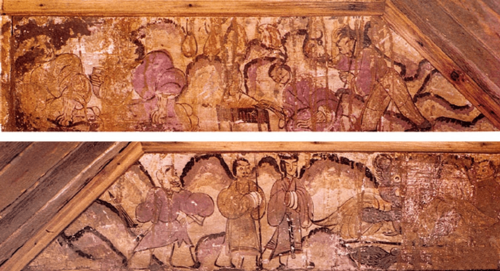
Xiang Yu was not happy that Liu Bang reached Guanzhong first. His advisor, Fan Zeng, and an informer from Liu Bang's camp, Cao Wushang, told him to kill Liu Bang. Xiang Yu planned a banquet to do this.
However, Xiang Bo, Xiang Yu's uncle and a friend of Zhang Liang, convinced Xiang Yu not to order the killing. Fan Zeng was frustrated. He told Xiang Yu's cousin, Xiang Zhuang, to pretend to do a sword dance and kill Liu Bang during it. But Xiang Bo joined the dance to protect Liu Bang.
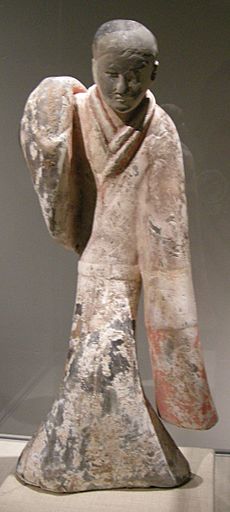
Zhang Liang secretly left and called Fan Kuai. Fan Kuai arrived in full armor. He bravely scolded Xiang Yu for his bad plan. Xiang Yu was embarrassed. He stopped the sword dance and praised Fan Kuai. Liu Bang then pretended to go to the bathroom and escaped. He led his army away. Xiang Yu then destroyed Xianyang and burned the Epang Palace.
Settling in Hanzhong
After taking Xianyang, Xiang Yu declared himself "Hegemon-King of Western Chu." He divided the old Qin Empire into Eighteen Kingdoms. He gave Guanzhong to three former Qin generals. He did not give it to Liu Bang, even though Liu Bang had reached it first.
Liu Bang received the remote Bashu region. This area was often used for exiling prisoners. Xiang Yu claimed it was part of Guanzhong. Zhang Liang, who was leaving for his home state, helped Liu Bang get a better deal. He bribed Xiang Yu through Xiang Bo. Liu Bang also received Nanzheng and the title "King of Han."
Liu Bang's army was led across the Qinling Mountains. On Zhang Liang's advice, Liu Bang burned the gallery roads behind him. This was to show Xiang Yu that he would not return. It also prevented attacks from Xiang Yu.
The Chu-Han War: A Big Rivalry
From 206 BC to 202 BC, Liu Bang and Xiang Yu fought a big war. This war is known as the Chu–Han contention. They were fighting to see who would rule all of China. Liu Bang also attacked and took over other kingdoms during this time.
Conquering the Three Qins
Life in Nanzheng was hard for Liu Bang's army. Most of his soldiers were from flatland regions. They found it difficult to live in the mountains of Bashu. Many soldiers ran away every day. Liu Bang also became very moody because he was unhappy.
One night, a rumor spread that Xiao He had also disappeared. Liu Bang almost had a breakdown. But Xiao He returned the next morning. Liu Bang angrily asked him for an explanation. Xiao He said he was chasing after a very talented military strategist named Han Xin. Han Xin was a low-ranking officer who had just joined Liu Bang's army. Xiao He then introduced Han Xin to Liu Bang. Han Xin presented his plan to conquer the states. Liu Bang was impressed and made Han Xin the supreme commander of his army.
Meanwhile, Xiang Yu's unfair way of dividing the kingdoms made many rebel leaders angry. Just four months after Liu Bang went to Bashu, a rebellion started in the Qi kingdom. Xiang Yu left Western Chu to stop this revolt.
Han Xin advised Liu Bang to send men to pretend to fix the burned gallery roads. This would distract the Three Qins. At the same time, Han Xin used this distraction to surprise attack Guanzhong through Chencang. He quickly defeated Zhang Han. After this, Sima Xin and Dong Yi surrendered to Liu Bang. By August or September 205 BC, the Three Qins became part of Liu Bang's Kingdom of Han.
A Big Defeat at Pengcheng
With Xiang Yu busy in the east, Liu Bang gathered a huge army of 560,000 soldiers. He marched east to attack Western Chu. On the way, he met Peng Yue, who joined him. Liu Bang sent Peng Yue's 30,000 soldiers to calm the surrounding area.
Liu Bang's army entered Xiang Yu's capital, Pengcheng, without a fight. They looted valuables and took women. But the soldiers became lazy and drank too much.
When Xiang Yu heard about Pengcheng, he took 30,000 soldiers to get his capital back. He attacked Pengcheng at dawn. By noon, he had completely defeated Liu Bang's unprepared army. He drove them into nearby rivers. Over 100,000 men drowned or were killed. The rest of Liu Bang's army fled south. But they were trapped by Chu forces near the Sui River, where another 100,000 drowned.
Liu Bang escaped with a few bodyguards. He went to Pei to find his family. Xiang Yu also sent troops to Pei to capture Liu Bang's family. His family had fled, but Liu Bang found his eldest daughter and second son, Liu Ying, on the road. The Chu army captured Liu Bang's father, Liu Taigong, and wife, Lü Zhi, as hostages. Some stories say his mother was also captured. The Records of the Grand Historian says Liu Bang pushed his own children out of his carriage three times to make it lighter. He was desperate to escape Xiang Yu's men. But Xiahou Ying kept putting the children back in the carriage, saving them.
Turning the Tide: Key Battles
After the terrible defeat at Pengcheng, Liu Bang's army was much weaker. Many kings who had joined Liu Bang now went over to Xiang Yu's side. Even the Qi and Zhao kingdoms, who were fighting Chu, wanted peace with Chu.
Liu Bang regrouped his troops at Xiayi. He sent a messenger to Ying Bu (King of Jiujiang) to ask for help. Ying Bu was angry at Xiang Yu's unfair land divisions. He agreed to join Liu Bang and rebelled against Western Chu. Xiang Yu sent Long Ju to attack Ying Bu.
In 205 BC, Liu Bang made his son Liu Ying his crown prince. He ordered him to defend Yueyang. Soon after, Liu Bang's forces took Feiqiu. This city was guarded by Zhang Han. Ying Bu couldn't defeat Long Ju, so he joined Liu Bang. Liu Bang reorganized his army. He had new soldiers from Guanzhong (sent by Xiao He) and Han Xin's troops. He attacked Chu at Jing County and Suoting. He won these battles. He pushed Xiang Yu's forces east of Xingyang.
The Final Battle at Gaixia
In 204 BC, Liu Bang's army was running out of supplies. Chu attacks had damaged their supply routes. Liu Bang tried to make a truce with Xiang Yu. He offered to give up lands east of Xingyang to Western Chu. Xiang Yu wanted to accept, but Fan Zeng told him to refuse and destroy Liu Bang. Xiang Yu changed his mind and attacked Xingyang. He trapped Liu Bang's forces inside the city.
Liu Bang followed Chen Ping's advice. He bribed Xiang Yu's men with gold. They spread rumors that Fan Zeng wanted to betray Xiang Yu. Xiang Yu believed the rumors and fired Fan Zeng.
Later that year, Xiang Yu was away fighting a rebellion in Qi. Li Yiji told Liu Bang to attack Western Chu. Han forces took Chenggao. They defeated the Chu army near the Si River. Liu Bang's forces moved further. Chu forces were trapped east of Xingyang. After Han Xin won the Battle of Wei River, the Chu army's morale dropped. They ran out of supplies months later. Xiang Yu had to make peace with Liu Bang. He released Liu Bang's family members, who were his hostages. Chu and Han agreed to a ceasefire at the Treaty of Hong Canal. This treaty divided China into east and west.
In 203 BC, while Xiang Yu was retreating, Liu Bang broke the treaty. He attacked Western Chu. He asked Han Xin and Peng Yue to help him attack Xiang Yu from three sides. But Han Xin and Peng Yue did not move their troops. Liu Bang was defeated at Guling. He had to retreat and strengthen his defenses. He sent messengers again to Han Xin and Peng Yue. He promised them land and titles if they joined him. They finally agreed.
Three months later, in 202 BC, Liu Bang, Han Xin, and Peng Yue attacked Western Chu from three directions. The Chu army was low on supplies. Xiang Yu was trapped in Gaixia. Han Xin ordered his troops to sing Chu folk songs. This made the Chu soldiers think their homeland had fallen to Han forces. The Chu army's spirits crashed, and many soldiers ran away. Xiang Yu tried to escape the siege. After fighting through many traps, he was left with only 28 men. He reached the Wu River. He made a last stand and killed hundreds of Han soldiers before he died.
Founding the Han Dynasty
In 202 BC, Liu Bang became emperor. His subjects supported him, even though he said he didn't want the throne. He named his dynasty "Han." He is known as "Emperor Gaozu." He made Luoyang his capital, which was later moved to Chang'an. He made his wife, Lü Zhi, the empress. Their son, Liu Ying, became the crown prince.
The next year, Emperor Gaozu wanted to reward the people who helped him found the Han Empire. But it took a year to decide because they couldn't agree on who deserved what. The emperor thought Xiao He had contributed the most. So, he gave Xiao He the title "Marquis of Zan" and the most food. Some people disagreed. They said Xiao He wasn't directly in battles. But Emperor Gaozu said Xiao He planned their strategy against Xiang Yu. He said Xiao He deserved the most credit. He named Cao Shen as the person who contributed most in battle. He rewarded Cao Shen and others too.
How Emperor Gaozu Ruled China
Lowering Taxes and Helping People
Emperor Gaozu sent his armies home. He said people in Guanzhong didn't have to pay taxes or do forced labor for 12 years. Those who went back to their hometowns were exempt for six years. The government would also support them for a year. He also freed people who had sold themselves into slavery because of hunger during the wars.
In 195 BC, the emperor made two important rules. The first officially lowered taxes and forced labor. The second set how much the vassal kings had to pay to the emperor each year. The land tax on farming was reduced to 1/15 of the crop. He also allowed private coining of money.
Bringing Back Confucian Ideas
When he was younger, Emperor Gaozu didn't like reading. He also didn't respect Confucianism. Even after becoming emperor, he felt the same way. But then he met a scholar named Lu Jia. Lu Jia wrote a 12-volume book called Xinyu. This book talked about the benefits of ruling with kindness and good morals. This was different from the harsh laws of the Qin dynasty. Lu Jia read each volume to the emperor. The emperor was very impressed.
Under Emperor Gaozu's rule, Confucianism grew strong. It slowly replaced Legalism, which was the main idea during the Qin times. Confucian scholars, like Lu Jia, were hired to work in the government. The emperor also changed the legal system. He made some Qin laws less strict. He also reduced the severity of some punishments. In 195 BC, after stopping a rebellion, he visited Shandong. This was the birthplace of Confucius. He personally held a ceremony to honor Confucius.
Choosing the Next Emperor
In his later years, Emperor Gaozu liked Concubine Qi more than Empress Lü Zhi. He thought his heir, Liu Ying (Empress Lü's son), was too weak to be a good ruler. So, he wanted to replace Liu Ying with another son, Liu Ruyi, whose mother was Concubine Qi.
Empress Lü Zhi was worried. She asked Zhang Liang to help her son keep his position. Zhang Liang suggested four wise men, the Four Whiteheads of Mount Shang, to help Liu Ying.
In 195 BC, Emperor Gaozu's health got worse. He wanted even more to replace Liu Ying with Liu Ruyi. Zhang Liang tried to change his mind but was ignored. So, Zhang Liang retired, saying he was sick. Shusun Tong (Liu Ying's tutor) and Zhou Chang also strongly disagreed with the emperor's plan. Zhou Chang said, "I'm not good at arguing, but I know this is wrong. If you remove the Crown Prince, I won't follow your orders anymore." Zhou Chang was outspoken and had a stutter, which made his speech funny to some. The emperor laughed.
After that, the Four Whiteheads of Mount Shang appeared in court. Emperor Gaozu was surprised. They had refused to join his government before. The four men promised to help Liu Ying if he remained crown prince. The emperor was happy to see Liu Ying had their support. So, he gave up the idea of changing his heir.
Military Actions and Peace Efforts
After starting the Han dynasty, Emperor Gaozu gave land to princes and vassal kings. He wanted them to help him rule. Seven of these kings were not related to him by blood. These included Zang Tu, King of Yan, and Han Xin, King of Chu.
However, the emperor later worried that these kings might rebel. He thought they might not be loyal since they weren't family. Han Xin and Peng Yue were accused of treason (though it might have been false). They were arrested and killed with their families. Ying Bu and Zang Tu did rebel, but they were defeated and killed. Only two non-family kings remained.
The Xiongnu people in the north had been a threat since the Qin dynasty. The First Emperor of Qin had built the Great Wall to stop them. But after the Qin dynasty fell, the Xiongnu moved south and raided the border again. In 201 BC, a Han king named Hán Xin joined the Xiongnu leader, Modu.
The next year, Emperor Gaozu led an army against the Xiongnu. But he was trapped by the enemy at the Battle of Baideng. Following Chen Ping's advice, he bribed Modu's wife with gifts. She asked her husband to pull back his forces, and Modu did. After returning to the capital, Emperor Gaozu started a policy called heqin. This involved sending noble ladies to marry Xiongnu leaders. He also paid annual tribute to the Xiongnu. This was done to keep peace between the Han Empire and the Xiongnu.
The End of His Reign
Emperor Gaozu was hurt by an arrow during a fight against Ying Bu. He became very sick. He stayed in his private rooms for a long time. He told his guards not to let anyone in. After several days, Fan Kuai forced his way in to see the emperor. Other officials followed him. They saw Emperor Gaozu lying in bed, attended by a eunuch.
Fan Kuai said, "How great it was when you led us to conquer the empire! Now we are tired. Your subjects are worried about your illness. But you refuse to see us and prefer a eunuch's company. Have you forgotten about Zhao Gao?" The emperor laughed. He got out of bed to meet his subjects.
Emperor Gaozu's health got worse. Empress Lü Zhi hired a famous doctor to heal him. When Emperor Gaozu asked about his condition, the doctor said he could be cured. But the emperor was not happy. He scolded the doctor, "Isn't it Heaven's will that I conquered this empire with just simple clothes and a sword? My life is decided by Heaven. It's useless even if Bian Que were here!" He refused more treatment and sent the doctor away.
Before he died, he said that Cao Shen could take over from Xiao He as the chancellor after Xiao died. He also said that Wang Ling could succeed Cao Shen. He thought Wang Ling might be too young, so Chen Ping could help him. He also said Chen Ping was qualified to be chancellor alone. He also named Zhou Bo as a possible Grand Commandant. Emperor Gaozu died in Changle Palace, Chang'an, on 1 June 195 BC. His son, Liu Ying, became the next emperor, known as Emperor Hui.
The Song of the Great Wind
The Song of the Great Wind is a song Liu Bang wrote in 195 BC. He wrote it when he visited his hometown in Pei County. This was after he stopped Ying Bu's rebellion. He held a banquet and invited all his old friends and townspeople. After some drinks, Liu Bang played the guqin (a Chinese instrument) and sang the song.
|
《大風歌》 |
Song of the Great Wind |
|
大風起兮雲飛揚, |
A great wind came forth, |
|
威加海內兮歸故鄉, |
Now that my might rules all within the seas, |
|
安得猛士兮守四方! |
Where will I find brave men |
Family of Emperor Gaozu
Emperor Gaozu had several wives and many children. Here are some of them:
- Empress Gao, Lü Zhi (241–180 BC)
- Princess Yuan of Lu (died 187 BC), his first daughter.
- Liu Ying, Emperor Xiaohui (210–188 BC), his second son and the next emperor.
- Empress Gao, Bo clan (died 155 BC)
- Liu Heng, Emperor Xiaowen (203–157 BC), his fourth son.
- Furen, Cao clan
- Liu Fei, King Daohui of Qi (221–189 BC), his first son.
- Furen, Qi clan (224–194 BC)
- Liu Ruyi, King Yin of Zhao (208–194 BC), his third son.
- Lady, Zhao clan (died 198 BC)
- Liu Chang, King Li of Huainan (199–174 BC), his seventh son.
- Children with unknown mothers:
- Liu Hui, King Gong of Zhao (died 181 BC), his fifth son.
- Liu You, King You of Zhao (died 181 BC), his sixth son.
- Liu Jian, King Ling of Yan (died 181 BC), his eighth son.
Images for kids
-
A jade-carved wine cup with relief decorations, Western Han (202 BCE – 9 CE)
-
A gilded bronze wine warmer with animalistic relief decorations, 26 BCE, Western Han period
See also
 In Spanish: Liu Bang para niños
In Spanish: Liu Bang para niños
 | Kyle Baker |
 | Joseph Yoakum |
 | Laura Wheeler Waring |
 | Henry Ossawa Tanner |


